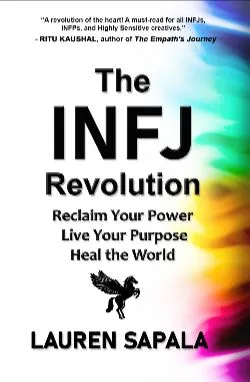
I picked up this book because I’ve been trying to figure out why I’ve been having such a hard time lately. I know this comes off as self-victimization, but I feel incompatible with the life I’m currently living. As a result, to try to figure out what to do differently, I’ve been playing with all different kinds of modern divination tools: personality tests, astrology, and so on. One that always comes up is MBTI. I’ve taken it numerous times in my life, and have always wound up as INFJ, although my extraversion/introversion placement tends to be near the border.
I’m well aware that Jungian personality types–which the MBTI measures–aren’t really well respected in psychological practice or research these days, but I do think it offers a system to help us make sense of the world. Moreover, I do believe that the category of “INFJ” has fit me much better than any other Jungian personality type.
I decided that it was time for me to figure out a bit more about this, and I came across Lauren Sapala’s book. She also maintains a blog where writes about topics relating to INFJ/INFP personality types.
I wish I had read a bit more about Sapala before diving into this book. While she does seem like an interesting and creative person, her book didn’t seem like it had very much to say about INFJ (or INFP) types. I think the biggest problem is that she relies on Myers-Briggs typology as a theory of everything. So much of the world gets filtered through this lens, which is totally fine for her experience of reality, but it really wasn’t helpful to mine. There’s a lot here about how intuitive INFJs are, and that they tend to be natural empaths that see and feel what others miss–all of these things are true. But, so much of the text relied on her experience and her feelings that it didn’t seem useful. It’s great that she’s intuitive, sensitive, and innate feeler, and so on, but I just don’t think she’s qualified to write it.
This is not to say that qualifications are everything–far from it–but it’s also really important to have finer understandings of distinctions between personality types and similarities within them in order to make assertions. Unfortunately, the only evidence included here comes from her own experience, or the experiences of people she knows.
This book would be a totally serviceable memoir–although a bit more storytelling might be necessary–but it isn’t really the self-help/psychology book that it advertises itself as. I don’t feel like I’ve come to know myself any better by having read it.
I’m very well aware that I’m good at intuiting situation, bad at recognizing my own emotions, but good at picking up on those of others. It goes without saying that I’m naturally introverted and sit in my room absorbing the same song on repeat in order to enter a trance-like state of elevate thought and creativity. It is also plenty obvious that I privilege one-on-one situations over any other larger social engagements. I feel insane when the ineffable tugs at my soul and I clench up when I immediately feel other people’s emotions and I need order in my external world in order to dip into the ocean within my own head.
But all of this was said in a much wordier manner than required. I had planned Sapala’s The Infj Writer: Cracking the Creative Genius of the World’s Rarest Type, but I think I’ll dodge it and read a work on mysticism instead.
The one major strength of the book is that I do feel heard by it–it’s nice knowing that there are other people like me out there, even when it doesn’t feel like it. I just wish that it were deeper.